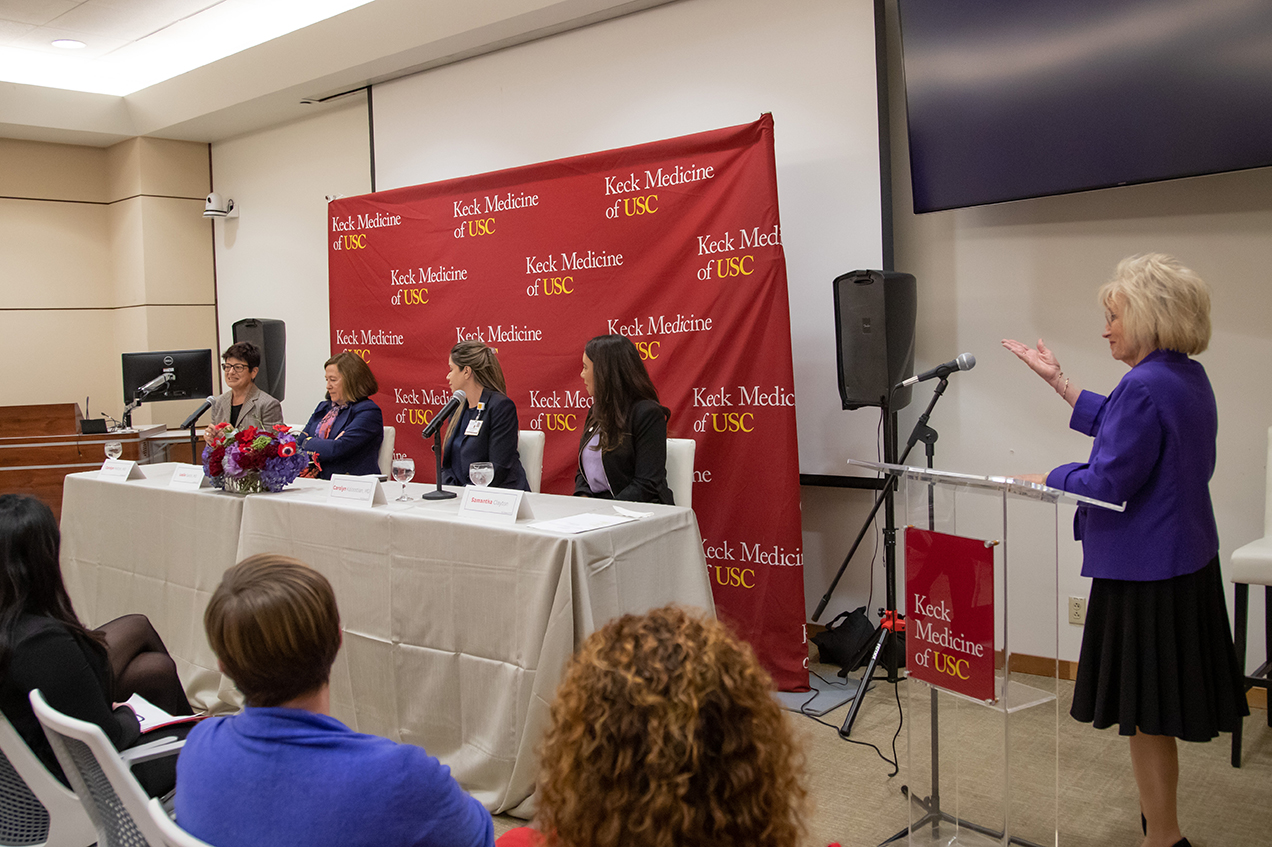On March 8, as the sun set over Keck Medicine of USC’s Health Sciences Campus, employees from across the enterprise gathered at Health Care Center 4 for the organization’s first annual International Women’s Day Symposium. The event — sponsored by Keck Medicine’s Women’s Initiative Network (WIN) and the American Heart Association’s Go Red for Women Movement — hosted a panel on the current state of women’s health with prominent leaders from both the health care and fitness industries.
“So often, women put the well-being of others before their own health,” said Shawn Sheffield, MBA, MHSA, chief strategy officer for Keck Medicine. “All of you here today approach your everyday tasks with intelligence, compassion and intention. And it is with intention that we officially launch our Women’s Initiative Network.”
WIN is one of the health system’s employee resource groups (ERGs). Founded in April 2022, ERGs are voluntary, employee-led associations where Keck Medicine’s workforce can join together in light of common demographics, backgrounds and interests. The goal of WIN is to raise awareness of gender equality and balance, and advocate for inclusion on all fronts in hopes to close the gender gap.
The symposium’s panel consisted of Carolyn C. Meltzer, MD, dean of the Keck School of Medicine of USC; Leslie Saxon, MD, executive director of the USC Center for Body Computing; Carolyn Kaloostian, MD, clinical associate professor of family medicine and assistant medical director of Keck Signature Care; Samantha Clayton, OLY, ISSA-CPT, vice president of sports performance and fitness education at Herbalife Nutrition; and Tammy Capretta, RN, MPH, chief transformation and risk officer for Keck Medicine.
As guests took their seats, Capretta began by telling her own harrowing story of unseen and unexpected health complications.
“This isn’t easy for me to talk about, but two years ago I suffered a stroke right here at work,” Capretta said. “The pain in my head sent me straight to the floor and scared me to death. The stroke was a result of decades of failing to prioritize my own health, a common trap for women who often take care of others before caring for themselves. I hope that my story, and the stories of our incredible panelists, inspire the women here today to reconsider how they’re approaching their health and know that their health doesn’t — and shouldn’t — take a backseat.”
During the symposium, panelists discussed a wide array of topics affecting women’s health, including health disparities for women, how to properly engage with a primary care provider and the importance of maintaining heart health.
According to the American Heart Association, women experience unique life stages such as pregnancy and menopause that can put them at increased risk for cardiovascular disease, yet they continue to be underrepresented in cardiovascular research. In fact, cardiovascular disease is a leading cause of death in women; over 44% of women ages 20+ are living with some form of cardiovascular disease, many of whom are unaware. Additionally, cardiovascular disease is the leading cause of maternal death in the U.S., and 1 in 5 women will experience a stroke in their lifetime.
“As women, in order to stay on top of our heart health, it is important that we view and define ourselves as leaders,” said Saxon. “As we’ve heard, so often women will put others before themselves. We must stay vigilant in maintaining our well-being so that we do not become subordinate and disadvantaged by heart disease and stroke.”
Keck Medicine and the American Heart Association have long collaborated on initiatives to raise awareness around cardiovascular disease, which accounts for more deaths in our communities than any other illness. Over the past 10 years, the American Heart Association has funded more than 45 research projects with Keck Medicine, totaling over $6 million. The enterprise has made a concerted effort to use the latest technologies in heart care, including the use of left ventricular assist devices (LVADs).
In 2019, Zuleyma Santos, a 35-year old mother of two, discovered she had peripartum cardiomyopathy — a form of heart failure that occurs during the last month of pregnancy or the first few months postpartum, weakening the heart. To save her life, Zuleyma was transferred from her local hospital to Keck Hospital of USC, where an LVAD was implanted. Nearly three years later she is still on the waiting list for a heart transplant, but the LAVD is helping her heart’s main pumping chamber send nutrient-and-oxygen-rich blood to the rest of her body. Now, the 38-year-old volunteers as a Go Red for Women ambassador, spreading the word about heart disease and the heart risks that can occur during pregnancy. “I choose to make my heart disease an ally and not an enemy,” Santos said.
International Women’s Day has been observed since the early 1900s. In 1975, the day was marked for the first time by the United Nations, and in December of 1977, the UN General Assembly adopted a resolution proclaiming a United Nations Day for Women’s Rights and International Peace to be observed on any day of the year by Member States, in accordance with their historical and national traditions. The 2023 International Women’s Day theme was “Embrace Equity.”
— Matthew Vasiliauskas


